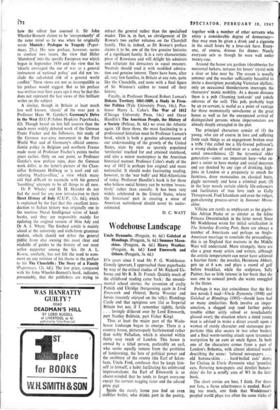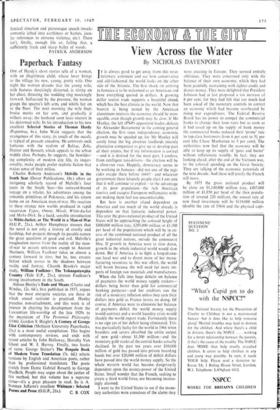Wodehouse Landscape
Uncle Dynamite. (Penguin, 4s. 6d.) Galahad at Blandings. (Penguin, 3s. 6d.) Summer Moon- shine. (Penguin, 4s. 6d.) Heavy Weather. (Penguin, 4s. 6d.) Lord Emsworth and Others. (Penguin, 3s. 6d.) IT'S years since I read Mr P. G. Wodehouse. Grossly ignorant, I approached these paperbacks by way of the critical studies of Mr Richard Us- borne and Mr R. B. D. French. Quickly much of the childhood reading came back : the unsenti- mental school stories; the invention of crafty Psmith and Ukridge (burgeoning again in Lord Emsworth and Others); Bertie Wooster and Jeeves (recently enjoyed on the telly); Blandings Castle and that egregious sow (fat as Imperial Britain but not, if I remember rightly, fertile . . . lovingly dithered over by Lord Emsworth, part Stanley Baldwin, part Fisher King).
Thus at least the major part of the Wode- house landscape began to emerge. There is a country house, picturesquely battlemented rather than nobly Palladian, which is situated within fairly easy reach of London. This house is owned by a titled person, preferably an earl, who seems equally remote from the probleins of landowning, the lure of political power and the snobbery of the county (the Earl of Icken- ham, Uncle Fred, confesses that he keeps him- self to himself, a habit facilitating his celebrated impersonations; the Earl of Emsworth is so absent-minded that he tends to forget everyone except the current nagging sister and the adored Prize Pig).
Inside the stately home you find an even statelier butler, who drinks port in the pantry, together with a number of other servants who enjoy a considerable degree of democracy— they may even be given a drink and a cigarette in the small hours by a love-sick hero. Every- one, of course, dresses for dinner. Nearly everyone acts as though he were well under twenty-one.
Around the house are gardens (shrubberies for nocturnal lurkers, terraces for lovers' trysts) with a river or lake near by. The season is usually summer and the weather sufficiently beautiful to invite a description parodying Victorian idyllists; only an occasional thunderstorm interrupts the characters' manic mobility. At a decent distance there is a pub (`foaming tankards' and yokels odorous of the soil). This pub, probably kept by an ex-servant, is useful as a point of vantage for those momentarily unwelcome at the great house as well as for the unexpected arrival of distinguished persons whose impersonators are already deeply entangled in the plot.
The principal characters consist of (1) the young, who are of course in love and suffering from such things as an engagement broken over a trifle (`she called me a lily-livered poltroon'), a wrong choice of soul-mate or a sense of per- sonal unworthiness; (2) the tyrannical older generation—aunts are important here—who ex- pect a suitor to have money and social decorum and are shocked by any sign of drinking, high- jinks in London or a propensity to smash the furniture, draw moustaches on classical busts, giggle nervously and have a criminal past; (3) in the later novels certain elderly life-enhancers and facilitators of true love such as Gaily Threepwood, Fred Ickenham and even the vulgar, gum-chewing process-server in Summer Moon- shine.
Villains are rarely as unpleasant as the gigolo- like Adrian Peake or as sinister as the feline Princess Dwornitzchek in the latter novel. Since Mr Wodehouse wrote for initial serialisation in The Saturday Evening Post, there are always a number of Americans and perhaps an Anglo- American marriage to conclude the proceedings; this is an England that matrons in the Middle West will understand. More strangely, there are also a great many artists and writers, although the artistic temperament can never have achieved a heartier form: the novelist, Hermione Abbott, gets up at 6 a.m. and plays a round of golf before breakfast, while the sculptress, Sally Painter, has so little interest in her busts that she uses one to conceal jewels she wants smuggled to the States.
Perhaps it was just coincidence that the first two novels I read—Uncle Dynamite (1948) and
Galahad at Blandings (1965) Should have had so many similarities. Both involve an imper- sonation, a slugged cop (and further police trouble either airily solved or nonchalantly glossed over), the situation where a timid young man is advised to make a direct assault upon a woman of sturdy character and statuesque pro- portions (this also occurs in two other books), and a final worm-turning attack upon tyrannical usurpation by an aunt or uncle figure. In both one of the characters comes from a part of London's Bohemia, with almost identical words describing the scene: 'tattered newspapers . . . old banana-skins . . . hard-boiled cats' doing for Chelsea in Uncle Dynamite what 'prowling cats, fluttering newspapers and derelict banana- skins' do for a scruffy area of WI in the later book.
The short stories are best, I think. For those not fans, a fierce selectiveness is needed. Read- ing too much, one finds that Wodehnuse's peopled world plays too often the same tricks of romantic jolted into earthiness or bathos, jocu- isn't, finally, enough life or, failing that, a sufficiently fresh and sharp ballet of words.
PATRICK ANDERSON



































 Previous page
Previous page